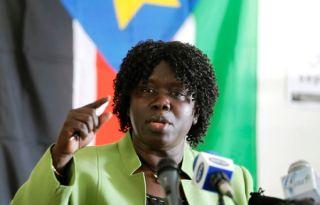Kiir gives green light for resumption of SPLM transformation processes
August 16, 2013 (JUBA) – President Salva Kiir Mayardit of South Sudan, who also chairs the ruling Sudan People’s Liberation Movement (SPLM), has finally instructed for resumption of the party’s transformation processes which stalled for five months following signs of internal power struggle for the top seat.

The SPLM deputy secretary general, Ann Itto, announced on the state-owned SSTV on Thursday after a meeting with the party chairperson that he had finally given a go-ahead for the party’s planned activities to resume.
The ruling party had embarked on transforming itself from a guerrilla movement into a viable political party capable of spearheading establishment of democratic governance in the country as well as leading the two-year old nation to prosperity.
This is also to adapt and conform to the realities of the political changes brought about by the secession and independence of South Sudan from the former Sudan in July 2011.
SPLM, which legally operates using the registration certificate provided by Khartoum in 2005, was early this year supposed to review its four basic documents: constitution, manifesto, code of conduct and rules and regulations before it could qualify for afresh registration as a political party in the new republic.
The party has also faced leadership challenges in formulating and implementing its policies throughout the country as reports gathered this year from all the ten states by the national secretariat clearly summarized that the party had “lost vision and direction”.
Numerous challenges such as on rampant corruption, which haunts the ruling party leaders and retards service delivery and development in government, as well as growing tribalism and insecurity, were among the issues of concern which demanded for a closer look at where things went wrong.
The party also elects its new leadership every five years and was supposed to hold its third national convention in May 2013, in accordance with its constitutional five-year term, as the last national convention which elected the current chairperson, Salva Kiir, was convened in May 2008 and should have expired three months ago.
However, the processes which started by a meeting on 5th March of members of the political bureau, which is the highest executive organ, hit a dead end due to a revelation that there were intentions to replace the current chair.
In that meeting chaired by the chairperson Salva Kiir, a number of senior party officials including the first deputy chairperson, Riek Machar Teny, reportedly revealed their intentions to unseat Kiir in the party’s driving seat during this year’s national convention and to subsequently run for the presidential seat on the party ticket in 2015 elections.
Although Machar, who served as Kiir’s deputy in government for the last eight years, maintained that his intention was democratically healthy and a right of every citizen or member of the party in the country to contest for the top seat in this year’s expected national convention, it raised eyebrows and created a friction between him and Kiir.
As a seemingly direct result of the intention to run for the party’s top job, Machar was sacked on 23rd July 2013, from the position as Vice-president of the republic, but has remained the deputy chairperson of the party as well as member of the national legislative assembly per election of April 2010.
After his removal as Vice-president, Machar called for calm, saying Kiir had the constitutional right to remove and appoint a new vice president. He however maintained that he will politically unseat Kiir in the party’s leadership as well as in government by 2015.
Kiir also suspended the party secretary general, Pagan Amum Okiech, accusing him of insubordination and incitement of tribalism following the latter’s criticism of the former on the suspension, now replacement, of two national ministers: Deng Alor Kuol of cabinet affairs and Kosti Manibe Ngai of finance and economic planning.
The SPLM deputy secretary general, Ann Itto, however said Kiir had now instructed the national secretariat to make preparations for a series of party meetings starting with the political bureau, national liberation council and extra-ordinary convention in order to pass the overdue basic documents.
Itto did not however contemplate on the schedules of such meetings.
Observers expressed fears that the former guerrilla movement, turned into political party, may fail the test of democratic transformation and peaceful transition to 2015 elections, as some of the top leaders may continue to resist changes that threaten their seats.
An observer said tough battles are ahead in the party as “red lines” are already drawn, adding that Kiir may not have a similar easy ride like in cabinet dissolution when dealing with the party and parliament.
Some of the senior influential leaders of the party, who seem to possess a feeling of discontent with Kiir, are also members of the parliament, he said, adding that the recent vote against Kiir’s most trusted and relied on advisor, Telar Ring Deng, which stripped him of his nominee to the new ministry of justice, is a clear sign that the parliament was rejuvenating.
“I will wait and see while putting my hands on my chest and only hope that the historical party will overcome the democratic challenges and not allow itself to disintegrate”, he said.
(ST)
